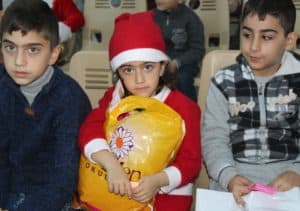Despite uncertainty, Christians in Iraq, Syria are urged to ‘keep Bethlehem in their hearts’
REMARKABLY, at year’s end, 6,330 families have returned from internal exile to their homes on the Nineveh Plains in northern Iraq, just in time for Christmas. That figure represents a third of families that were displaced by ISIS in 2014. And many more want to return, pending the repair or reconstruction of their homes.

“However, returnees are not coming back to a secured region,” reported Father Andrzej Halemba, who heads our organization’s Middle East desk. Just back from a fact-finding mission to the region, Father Halemba said the tension between Baghdad and Kurdistan, the semi-autonomous Kurdish region of Iraq, is palpable. Last September, Kurdistan held a referendum on declaring independence from Iraq, with the yes vote carrying the day. Should the two sides take up arms, the Nineveh Plains would become a battle ground once again.
The city of Mosul remains barely accessible to Christians, according to Father Halemba. The university has reopened and Christian students are returning there to continue their studies; “however, Christians are still not really welcome in this Iraqi city,” the priest said. So far, it has not been possible to clear the city’s churches, which continue to serve as repositories for the corpses of ISIS fighters. Father Halemba explained: “The bodies cannot be removed and given a dignified burial. The local authorities do not allow it. They want money for it.”
Father Halemba said that the situation in the city of Bartella on the Nineveh Plains also remains tense. Yet there is cause for joy there: for the first time since the ouster of ISIS, Christians will be celebrating Christmas in their own, newly restored church, the Syriac-Orthodox Church of Saint Shmouni.
Christians returning to the Nineveh Plains town of Telleskuf are also helping to rebuild and restore the spirit of the people. For example, eligious sisters are taking care of traumatized children and women. Father Halemba said: “Everyone who is helping to rebuild there is investing their personal courage and vision for the future.” He added: “That is the foundation for rebuilding relations between people.” The local Chaldean community was able to celebrate Christmas in their hometown for the first time in four years, in the re-consecrated Church of St. George.
Father Halemba reported that the situation in Syria is considerably worse. In Homs, for example, although some 2,700 houses have already been restored, only 700 families have returned. The priest said that this is proof of the deep uncertainty that the people there are feeling. They fear for their lives and are concerned about the safety of their children—this is keeping many from returning to their homes.” However, he noted, many of the houses have not been sufficiently restored and there is not enough money and support to complete the work needed.
However, this is not keeping the people from praying for peace, Father Halemba said. And this is also what the local Church is focusing on in its Christmas message: “Keep Bethlehem in your hearts!”
Aid to the Church in Need is helping to restore houses and churches as well as carry out pastoral work in both Syria and Iraq. The organization has dedicated its Christmas campaign to supporting the initiative “Back to the Roots,” which oversees the resettlement of displaced Iraqi Christians on the Nineveh Plains.
—Karla Sponar

